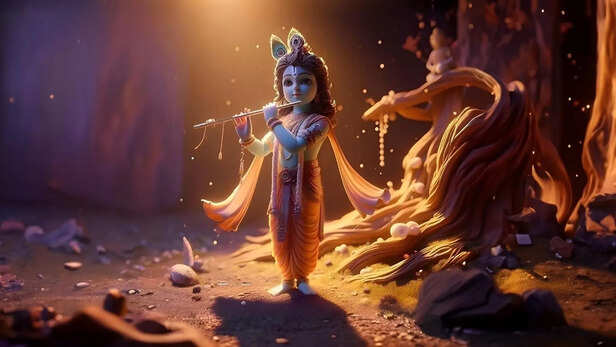Kurukshetra Within: Conquering Doubt and Embracing Dharma , The Gita's Wisdom
Tarun Badghaiya | Apr 01, 2025, 13:10 IST

The Bhagavad Gita contains a timeless lesson about the conflict between karma (action) and dharma (duty). Lord Krishna tells Arjuna on the battlefield of Kurukshetra that morality must take precedence over personal attachments, especially when confronted with one's own people. This article investigates why obligation transcends relationships, how genuine action is unselfish, and why inner struggle is frequently the most difficult war. By applying these teachings to modern life—whether in the workplace, family, or society—we can navigate moral dilemmas with clarity, ensuring that justice and righteousness triumph over emotions.
The Bhagavad Gita, one of Hindu philosophy's most profound spiritual scriptures, teaches a timeless lesson on the fight between karma (action) and dharma (duty). The discussion between Lord Krishna and Arjuna on the battlefield of Kurukshetra is an analogy for the challenges we experience in our own lives, when personal emotions frequently collide with our responsibilities. One of the most remarkable messages of the Gita is the importance of remaining constant in duty, even if it means going against one's people.
Dharma is simply defined as righteousness, responsibility, and moral obligation. It is the way that reflects cosmic order and universal fairness. Each person has their dharma, which is determined by their job in life, such as teacher, leader, soldier, or parent.
In contrast, karma refers to the principle of action and its consequences. It states that every action has an outcome, determining one's fate in this world and beyond. The Gita emphasises Nishkama Karma, or selfless action, which is doing one's task without concern for the outcome.
However, life frequently presents situations in which dharma and karma appear to be at odds, leaving one in a condition of moral confusion.

The Mahabharata's great war at Kurukshetra was a spiritual battleground as well as a political one. Arjuna, the Pandavas' mightiest warrior, was experiencing a profound moral dilemma. As he stood on the battlefield, ready to fight, he noticed his own relatives—his cousins, professors, and beloved elders—on the other side. He hesitated, overwhelmed by pain and doubt. He doubted the morality of slaughtering his own people for the sake of a kingdom and gave up his bow in despair.
At this important point, Lord Krishna gave Gita wisdom. He reminded Arjuna that his responsibility as a Kshatriya (warrior) was to preserve justice, even if it meant going up against his own family. Krishna taught that personal feelings should not cloud one's responsibilities. Dharma should always take precedence over attachments, and true righteousness sometimes demands difficult choices.

Dharma transcends personal relationships. One of the Gita's most important precepts is that virtue transcends human relationships. While familial affection and respect are important, they cannot be used to avoid one's responsibilities. If injustice is being perpetuated, remaining silent—especially owing to personal ties—makes one complicit.
The Greater Good Must Prevail. Arjuna’s hesitation stemmed from his focus on immediate relationships rather than the broader picture. Krishna taught him to go above individual losses and consider the overall wellbeing of society. Decisions in any leadership or ethical crises must be guided by a long-term vision of justice and harmony.
True action is selfless. Krishna emphasises Nishkama Karma, or acting without selfish motives or personal gain. If one's duty requires them to take a firm stance, they must do so without regard for the outcome. Throughout history, leaders, activists, and reformers have been forced to confront their own communities in order to achieve justice.
Inner conflict is the true battle. More than external warfare, the greatest struggle is within oneself—the conflict between duty and personal attachments, righteousness, and emotions. Living according to dharma entails facing this internal fight with courage and clarity.

The Gita's teachings are not limited to ancient conflict; they are highly applicable to today's concerns.
1. In the workplace, there are occasions when one must speak out against unethical behaviour, even if it means confronting colleagues or superiors.
2. In Family Matters: Maintaining justice and fairness may necessitate standing up to wrongdoing, even inside one's own family.
3. In the Social and Political Arenas: Many reformers and revolutionaries have had to confront their own communities, fighting against obsolete norms and injustices.
The Gita teaches us that duty must be upheld despite personal cost. Just as Arjuna was urged to fight, we must be willing to stand up when justice is at stake.
The Bhagavad Gita emphasises that the path to dharma is frequently tough and riddled with unpleasant choices. However, righteousness must be prioritised over personal relationships. Whether on the battlefield of Kurukshetra or in the battles of everyday life, we must have the fortitude to act when duty demands, even if it means confronting our own people.
Embodying the principles of selfless action and greater wisdom allows one to negotiate the karma and dharma challenges with clarity and strength, guaranteeing that justice and righteousness triumph over personal emotions.
Explore the latest trends and tips in Health and Fitness, , Travel, Life Hacks, Fashion & Beauty, and Relationships at Times Life
Understanding Dharma and Karma
In contrast, karma refers to the principle of action and its consequences. It states that every action has an outcome, determining one's fate in this world and beyond. The Gita emphasises Nishkama Karma, or selfless action, which is doing one's task without concern for the outcome.
However, life frequently presents situations in which dharma and karma appear to be at odds, leaving one in a condition of moral confusion.

Krishna
Arjuna's dilemma: A Duty Lesson
At this important point, Lord Krishna gave Gita wisdom. He reminded Arjuna that his responsibility as a Kshatriya (warrior) was to preserve justice, even if it meant going up against his own family. Krishna taught that personal feelings should not cloud one's responsibilities. Dharma should always take precedence over attachments, and true righteousness sometimes demands difficult choices.

krishna
Why You Must Be Prepared to Fight Your Own People.
The Greater Good Must Prevail. Arjuna’s hesitation stemmed from his focus on immediate relationships rather than the broader picture. Krishna taught him to go above individual losses and consider the overall wellbeing of society. Decisions in any leadership or ethical crises must be guided by a long-term vision of justice and harmony.
True action is selfless. Krishna emphasises Nishkama Karma, or acting without selfish motives or personal gain. If one's duty requires them to take a firm stance, they must do so without regard for the outcome. Throughout history, leaders, activists, and reformers have been forced to confront their own communities in order to achieve justice.
Inner conflict is the true battle. More than external warfare, the greatest struggle is within oneself—the conflict between duty and personal attachments, righteousness, and emotions. Living according to dharma entails facing this internal fight with courage and clarity.

Krishna
Applying the Gita's Wisdom in Modern Life
1. In the workplace, there are occasions when one must speak out against unethical behaviour, even if it means confronting colleagues or superiors.
2. In Family Matters: Maintaining justice and fairness may necessitate standing up to wrongdoing, even inside one's own family.
3. In the Social and Political Arenas: Many reformers and revolutionaries have had to confront their own communities, fighting against obsolete norms and injustices.
The Gita teaches us that duty must be upheld despite personal cost. Just as Arjuna was urged to fight, we must be willing to stand up when justice is at stake.
The Bhagavad Gita emphasises that the path to dharma is frequently tough and riddled with unpleasant choices. However, righteousness must be prioritised over personal relationships. Whether on the battlefield of Kurukshetra or in the battles of everyday life, we must have the fortitude to act when duty demands, even if it means confronting our own people.
Embodying the principles of selfless action and greater wisdom allows one to negotiate the karma and dharma challenges with clarity and strength, guaranteeing that justice and righteousness triumph over personal emotions.
Explore the latest trends and tips in Health and Fitness, , Travel, Life Hacks, Fashion & Beauty, and Relationships at Times Life
